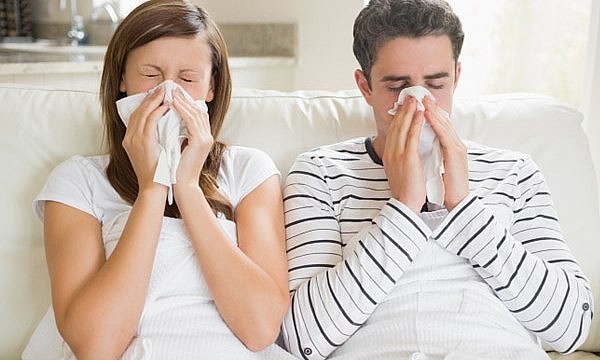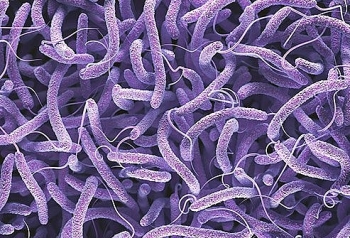Top 9 Common Diseases in Winter and Tips to Prevent
 |
| Common Diseases in Winter |
| Contents |
In winter, the climate is cold and dry, accompanied by rains, which are favorable conditions for bacteria to multiply and grow. Asthma, stroke, itching in addition, sinusitis, joint pain.... are common diseases when the weather turns cold.
1.Colds
By frequently washing your hands, you can avoid getting colds. By doing this, you can get rid of bacteria that you might pick up from using shared objects like light switches and doorknobs.
It's crucial to properly wash your hands. If someone in your home is ill, it's especially important to keep your home and household items like cups, cups, and towels clean.
Prevent and Treat: By frequently washing your hands, you can avoid getting colds. By doing this, you can get rid of bacteria that you might pick up from using shared objects like light switches and doorknobs. It's crucial to properly wash your hands. If someone in your home is ill, it's especially important to keep your home and household items like cups, cups, and towels clean. Use disposable tissues rather than handkerchiefs if you have a cold to avoid repeatedly washing your hands and towels.
Pro Tip: If you have a cold, use disposable tissues instead of handkerchiefs to avoid having to wash your hands and wash towels repeatedly.
Check More: Why Do We Catch the Cold and Flu Most Often in the Winter?
2.Sore Throat
A sore throat is a common occurrence during the winter, and the majority of the time, it is brought on by a viral infection.
There is some evidence to suggest that temperature differences and variations, like going from a warm room to a cold outdoor environment, also have an effect on the throat.
Gargling with warm salt water is one of the quick and easy home remedies for a sore throat, and it is also one of the preventative measures that can be taken. Although gargling with salt water will not cure an infection, it does have properties that reduce inflammation and can help soothe a sore throat.
Gargling with warm salt water is a tried-and-true method for relieving the discomfort caused by a sore throat. Although gargling with salt water will not cure an infection, it does have properties that reduce inflammation and can help soothe a sore throat.
3.Asthma
The presence of asthma symptoms like wheezing and difficulty breathing can be significantly worsened by exposure to cold air. Those who suffer from asthma should take extra precautions during the winter months.
Individuals, families, and society as a whole bear a significant burden as a result of asthma's many negative effects.
A helpful piece of advice is to remain indoors on days when the wind is blowing and the temperature is dropping. If you have no choice but to go out, you should cover your mouth and nose with a scarf or a mask.
Make sure to take extra precautions, stock up on common medications, and bring along any inhalers or sprays you might need.
If you want to avoid having an asthma attack, you should always make sure to keep warm.
4.Norovirus Syndrome
The common virus known as norovirus is highly contagious and is responsible for inflammation in the gastrointestinal tract. It is possible to become infected at any time of the year, regardless of the season; however, transmission is at its highest during the winter months and in social settings such as schools, hotels, and nursing homes.
People who are infected with the norovirus experience a great deal of discomfort, but thankfully this only lasts for a few days.
When a patient has diarrhea and vomiting, it is essential for them to drink a lot of water to prevent dehydration. This is especially important for young children and the elderly. However, drinking electrolytes is the most effective way to treat the condition.
5.Joint Pain
Many people who suffer from arthritis claim that the winter months bring about a worsening of their joint pain and stiffness for reasons that are not fully understood. There is no evidence to support the claim that changes in the weather are responsible for joint damage.
There is no evidence that changes in the weather cause damage to the joints.
A helpful tip: A lot of people experience a mild depression during the gloomy winter months, which can make their pain feel even worse. Regular exercise has been shown to improve both mental and physical state. Swimming, because of the way it works out the joints, is an excellent form of exercise.
6.Stomach Pain Due to Cold
Stomach pain is a common symptom of cold weather, and ulcers can feel even worse when the temperature is low. Even though there is no proven method for preventing stomach ulcers, you can lessen your likelihood of developing them by maintaining a healthy lifestyle and building up your immune system.
Tip: Make it a daily habit to engage in activities that reduce feelings of stress, such as soaking in a warm bath, strolling through the park, or watching one of your favorite movies.
7.Heart Attack
Winter is also the season with the highest incidence of heart attacks. This could be due to the fact that cold weather causes an increase in blood pressure, which places additional strain on the heart. When it's cold outside, your heart has to work harder to keep your body warm, which puts additional strain on your heart.
Pro tip:
Keep your home warm. Make sure the temperature in the room is at least 18 degrees Celsius, and if you want to stay warm while you sleep, use a hot water bottle or an electric blanket.
When you go outside, make sure to bundle up and don't forget to wear a hat, a scarf, or gloves.
8.Cold Hands
In cold weather, many people experience cold hands, a condition that causes their fingers and toes to turn a different color and become excruciatingly painful.
There is a possibility that the fingers will become white, then blue, then red and swollen. Your hands and feet experience a reduction in blood flow as a result of the constriction of small blood vessels in those areas.
Pro Tip: Don't smoke or drink coffee (both can worsen symptoms) and always wear gloves, socks and warm shoes when out in cold weather.
9.Flu
The flu can be fatal, especially to people over 65, pregnant women, and those with chronic illnesses like diabetes, kidney disease, and chronic obstructive pulmonary disease (COPD). Getting vaccinated is the best way to ward off the flu.
The flu shot lasts a year and offers good protection against the virus. In order to avoid pneumonia, you should get the pneumococcal vaccine if you are older than 65 or suffer from a chronic illness.
Check More: Why Do We Get Flu Easily in Winter?
How to Prevent Common Diseases in Winter
Actively exercise
You can boost your immune system and protect yourself from disease by participating in physical activity. You should make it a habit to get some form of physical activity first thing in the morning, as this will help you get your body ready for the day and get you in a positive frame of mind.
Wash your hands everyday
Make it a routine to wash your hands with soap every day, especially if you work or interact with lots of people. To ward off colds, the flu, and other illnesses, frequently wash your hands and use alcohol-based hand sanitizer.
Healthy diet
Pick nutritious foods, vary your meals with lots of fresh produce, lean protein, and minimal processed foods. Vitamins are found in green vegetables and fruits, and the immune system is bolstered by nuts, olive oil, honey, and garlic.
Dress appropriately
Even though it is winter, you may still perspire if the room is too warm, if you are wearing too many layers, or after working out. In these situations, you should quickly change into dry clothes to prevent dehydration. either get sick or get sick.
Conclusion
To prevent and avoid disease recurrence in the cold season, it is necessary to pay attention to keeping the body warm, avoiding dust, cleaning the nasal passages daily, using a healthy diet and drinking plenty of fluids to avoid catching a cold.
 What is Cholera: Symptoms, Causes, Transmission, Best Treatments for a Common Diseases in India What is Cholera: Symptoms, Causes, Transmission, Best Treatments for a Common Diseases in India Cholera is an acute epidemic infectious disease. It is characterized by watery diarrhea, extreme loss of fluid and electrolytes, and severe dehydration and it can ... |
 What is Amoebiasis: Symptoms, Causes, Transmission, Treatments for a Common Diseases in India What is Amoebiasis: Symptoms, Causes, Transmission, Treatments for a Common Diseases in India Amoebiasis is a common infection of the human gastrointestinal tract. Amoebiasis is more closely related to poor sanitation and socioeconomic status than to climate. ... |
 Top 10 Common Diseases In the World That Have the Highest Mortality Rate Top 10 Common Diseases In the World That Have the Highest Mortality Rate The following are the 10 most deadly diseases in the world as ranked by the World Health Organization (WHO). |























